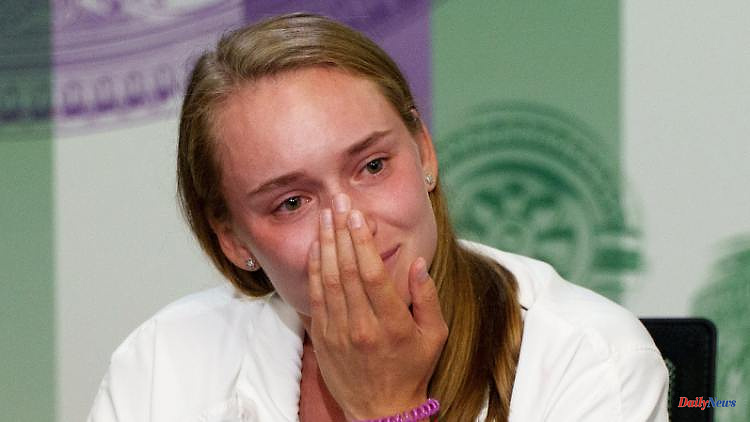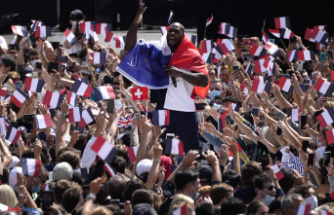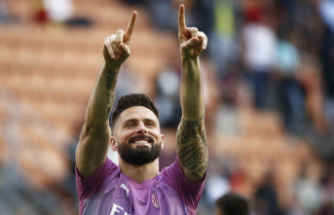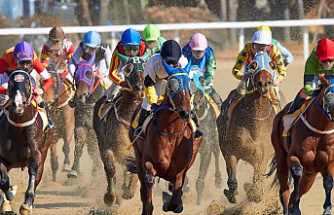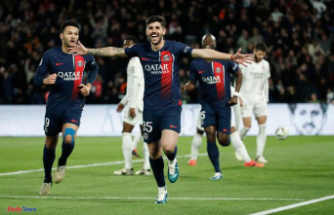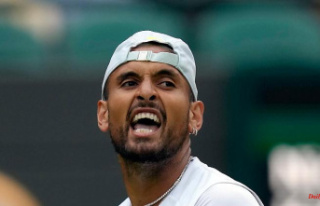Jelena Rybakina receives congratulations from Kazakhstan and Russia for her completely surprising Wimbledon triumph. Born in Moscow, she has been competing for the Central Asian country for four years. She is overwhelmed by her victory in the lawn classic and overwhelmed by questions about the war.
At the thought of her parents, Yelena Rybakina cried. "They would probably be super proud," said the 23-year-old on the evening of her Wimbledon triumph. Without much emotion, the Russian-born celebrated the moment of the unexpected victory, which would have been impossible without her change of country four years ago. And when the first Kazakh Grand Slam tournament winner received the Venus Rosewater Dish as a trophy from Duchess Kate on Saturday, she seemed overwhelmed by her unexpected premiere success. "I'm speechless, I was super nervous before the game and during the game," Rybakina said. "I'm glad it's over, I've never felt anything like it."
Rybakina turned the final against Ons Jabeur from Tunisia, second in the world rankings, 3: 6, 6: 2, 6: 2 and was able to celebrate the greatest success of her career. "I still have to teach her how to party really well," Jabeur joked, given the cool way Rybakina reacted on the pitch. Because of the Russian war of aggression in Ukraine, professionals from Russia and Belarus were excluded from Wimbledon. Rybakina had said several times during the tournament that she was happy to represent Kazakhstan. "They believed in me. There's no question how I feel anymore. I've been on a journey as a Kazakh player for a long time." When asked about the war, she said she wanted it "to be over as soon as possible". After her victory, she thanked the Kazakh association president Bulat Utemuratow for the trust and hugged him in the stands. "I'm really thankful for everything."
When asked if she feared her victory in Russia could be used politically, she replied: "I don't know what's going to happen. There will always be some news, but I can't do anything about it." She has played for Kazakhstan for a very, very long time. "I represent it at big tournaments, at the Olympics, when a dream came true," Rybakina said. "I didn't choose where I was born." She was also confronted with Russia's war of aggression and the actions of Vladimir Putin. "People believed in me. Kazakhstan supported me so much. Also today there was so much support, I saw the flags. I don't know how to answer these questions," she said evasively.
President Kassym-Jomart Tokayev congratulated Kazakhstan on a "historic victory". Rybakina is an "outstanding athlete," tweeted the head of state of the Central Asian country about Kazakhstan's first individual triumph in a Grand Slam tournament. She also received congratulations from Russia. "We have contributed a lot to their development," Shamil Tarpishchev, head of the Russian Tennis Federation, told the Russian newspaper "Sport-Express". "Are there any grudges against them? No. This is sport. Everyone chooses their own path. That is their right." Before the final, she avoided questions about where she lived in Moscow. Due to her many trips, she is actually at home on the tour. "I spend most of my time on tour. I train between tournaments in Slovakia, have camps in Dubai. So I don't live anywhere to be honest."
Jabeur initially dominated the game. But Rybakina fought back with her powerful game in front of celebrities like actor Tom Cruise. Born in Moscow, who changed nationality in 2018, will receive two million British pounds (equivalent to 2.36 million euros) for her triumph. Jabeur was paid £1.05m to reach the final and missed out on the first Grand Slam title by an Arab and African player. "I'm glad I've inspired so many generations from my country," said the 27-year-old, who has insisted that she plays for all Arab and African players. "You are an inspiration not only for juniors, but for everyone," Rybakina enthused about her opponent. "You have an incredible game, I enjoy playing you so much."
It quickly became clear that it would be a completely different game for Jabeur than in the semifinals against her German friend Tatjana Maria, which had been characterized by great finesse and many undercut duels on both sides. As usual, Rybakina relied on her powerful serve and powerful groundstrokes. In contrast to the impressive semi-final success against former winner Simona Halep of Romania, she showed nerves and struggled with her opponent's slice. After a backhand error by the Kazakhs, Jabeur got the first break to make it 2-1 and jumped for joy. Rybakina stayed close in a hard-fought game, but wasn't able to put enough pressure on her opponent when Jabeur served. The Tunisian used her first set ball for the second break after just 32 minutes and the deserved 6:3.
Rybakina was initially unimpressed and took the service from her opponent for the first time with the first chance. Jabeur still had fun, headed a ball after the point, returning a lob running back through the legs. But rhythm, concentration and a little later the second set were gone. Also in the decisive round, Rybakina had fewer problems with her opponent's drop shots than at the beginning and immediately got the break. Jabeur became increasingly desperate and missed three breakballs when the score was 2:3. Instead, she gave up her own serve again and allowed herself an error on Rybakina's first match point.

